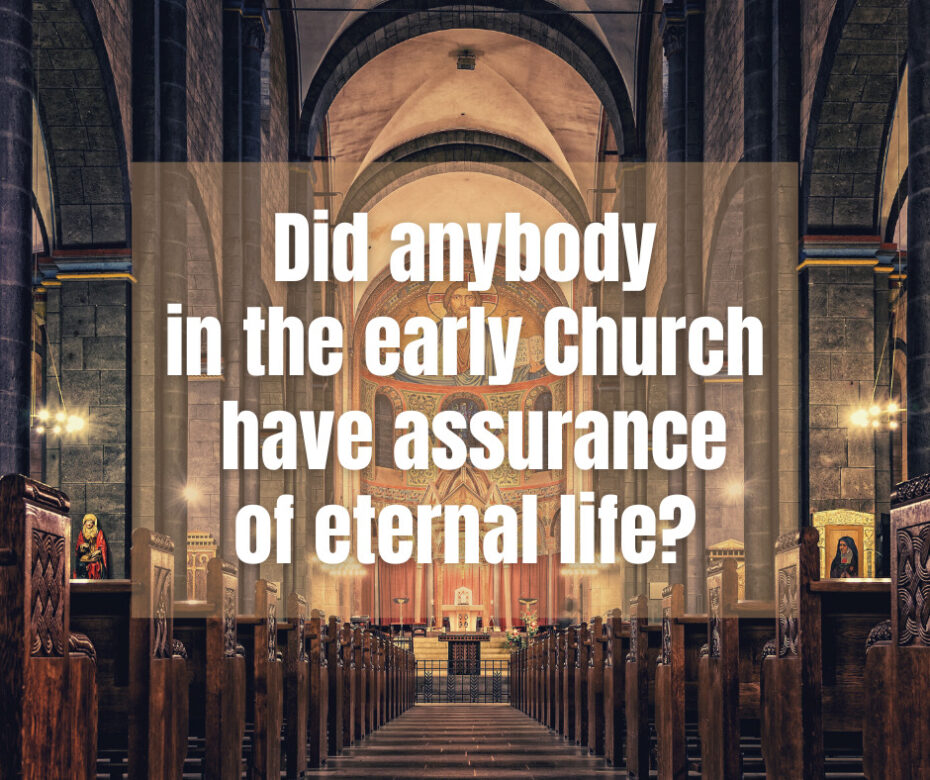Many Free Grace teachers, myself included, maintain that assurance of eternal life is of the essence of saving faith. What we mean by that is that when a person believes in Jesus Christ for eternal life, in that moment they know they have it. That is what Jesus promises. In addition, the word eternal in eternal life means that it cannot end. If a person believes that Jesus has given them eternal life, then they know they will have that life forever. Of course, a believer can lose that assurance later; nevertheless, he still has eternal life.
Most teachers reject that idea. They say that a person doesn’t have to know they have eternal life as long as they believe in Jesus for something—the forgiveness of sins, or salvation for now, or a new life. The new “believer” may think God has wiped the slate clean at the moment of faith by washing away all of his previous sins, and that he must now keep doing good works in order to make it into the kingdom. Because of Jesus’ death and resurrection, he at least has a fighting chance to live forever with the Lord. There are untold numbers of people in churches who live their lives that way. They might put their chances of making it into the kingdom at 50/50.
One of the arguments used by those who say a person doesn’t need to have assurance at the moment of faith in order to receive eternal life is the history of the early Church. It is pointed out that for most of church history everybody was Catholic. The Catholic church does not teach assurance. It teaches a salvation by works. When you read the early Church Fathers, you see that they didn’t teach assurance of salvation, either. They taught a gospel of works. They threatened their believing readers with an eternity in hell if they didn’t do what was required of them. Based on this, the conclusion is drawn that nobody in the early church knew they had eternal life. If guys like me are correct, then nobody in the first fifteen hundred years of the Church was saved. We know that this cannot be the case because the Lord said that that gates of hell will not prevail against His Church.
In answering the argument from early Church history, I respond that there were, indeed, believers in every generation. God always sends out His messengers to proclaim the message of eternal life by faith in Christ (e.g., Rom 10:14-21). There have always been house churches that clearly taught God’s Word. There were churches other than Catholic (or Orthodox) churches in the first fifteen centuries.
Even in Catholic churches people would have heard the Scriptures read. They would have heard verses like John 3:16, John 5:24, and John 11:25-26. Some could have believed the simple message with a childlike faith. Many (I would say most) people in pews today believe things that are contrary to what is being taught in the pulpit. There would have been some in the Catholic church who believed in Christ for eternal life even though the corporate church did not teach a message of assurance and grace.
Recently I was reading an old book that confirmed that there were people in every age of the Church who believed the message of eternal life by faith alone. It pointed out something that is very simple, but that I had missed. The book is The Pilgrim Church, by E. H. Broadbent. Broadbent discusses two heretics in the early Church, Montanus and Marcion. I had studied a little about these two men. Montanus was an early charismatic leader in the Church who emphasized the work of the Holy Spirit. Marcion was a man who rejected much of the Bible and only taught those parts that suited his beliefs.
Broadbent talks about why these men gathered a following (pp. 35-36). They lived in the second century, and the church was already moving towards things that would result in the Catholic church, such as bishops and priests. In one way, they were protesting what they were seeing. Montanus, for example, was saying that the Spirit, not a bishop, should have more authority over believers.
This short discussion made me realize that the early Church was made up of a multitude of house churches. People met in their homes and spoke about the Lord and what they believed. These churches existed all over the evangelized world. Even when bishops started promoting their unbiblical authority, there were many farmers, workers, housewives, etc., who would not have been subject to their proclamations. There would have been many different beliefs among the people.
The same thing is true today. If we go to a country that is dominated by the Catholic church, there are still many small churches that are not Catholic. And some who do attend Catholic churches reject the authority of the pope and the local priest, even though they attend the church.
Montanus and Marcion were heretics. But they show that there have always been people who fought against the theological trends of their day. When we consider the thousands upon thousands of small churches in the early Church, that there have always been those who heard verses like John 3:16 and knew in a moment that Jesus would keep His promise. They knew they had eternal life.


